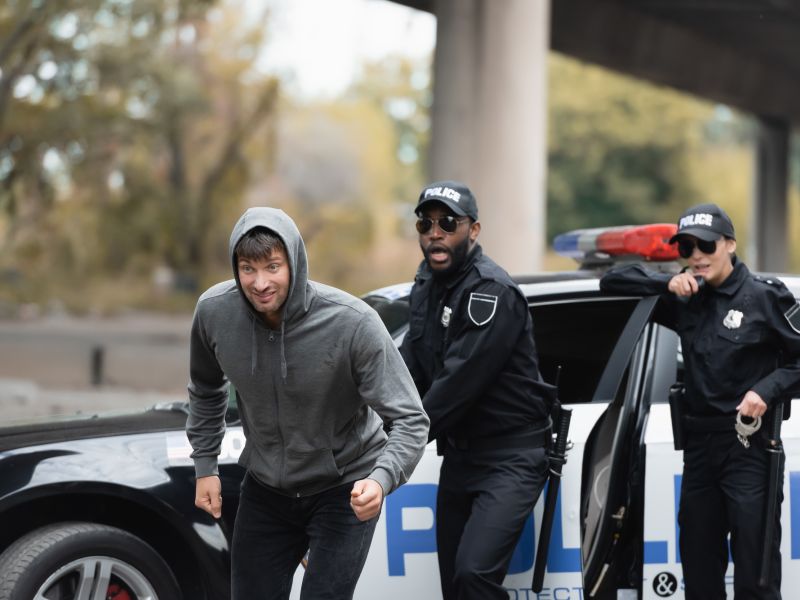
— Military
Legal Defenses Against Eluding The Police Charges
Eluding the police is a serious offense that can carry significant penalties, including fines, jail time, and a permanent mark on your criminal record. If you find yourself facing charges of eluding the police in Virginia, understanding the potential defenses that may be available in your case may help you to make informed decisions about how to proceed. A skilled criminal defense attorney with Driving Defense Law may be able to review your case and help you evaluate your legal options. Our firm offers free case evaluations throughout Virginia, so give our central Norfolk office a call today at (757) 929-0335.
What Is the Charge of Eluding Police in Virginia?
Drivers often follow instructions from law enforcement personnel without giving their own obedience much thought, for instance when awaiting the hand signals of a police officer “waving traffic” to prevent further injuries at the scene of a crash. In reality, however, Virginian motorists are required by law to comply with the directions of law enforcement officers when operating their vehicles on the state’s roadways. A driver who fails to act promptly in response to a law enforcement officer’s signaled instructions – whether visual or verbal – may be charged with a violation of § 46.2-817 of the Code of Virginia. Known variously as “disregarding signal by law-enforcement officer to stop” and “eluding police,” an alleged violation of § 46.2-817 constitutes a serious charge with limited options for legal defense and steep penalties in the case of a conviction.
“Willful and Wanton” Disregard
An individual who ignores a visual or audible signal to stop from a law enforcement officer and continues driving may be charged with eluding the police if the driver willfully and wantonly ignores the signal. Under § 46.2-817(A), the driver may also be charged with a violation if he or she departs the vehicle but, instead of surrendering to law enforcement, attempts to flee the scene on foot; § 46.2-817(B) does not include provisions for suspects fleeing on foot, but addresses two additional contingencies:
- The driver’s interference with the operation of the law enforcement vehicle
- The driver’s endangerment of other persons during the attempt to elude police
The “willful and wanton” qualification for a driver’s “disregard” of a signal from law enforcement personnel to stop can be important in the construction of a legal defense against eluding the police charges if the driver is able to make the case that he or she did not realize the signal to stop was directed at him or her; note that this defense may become somewhat more difficult to support if the driver left the vehicle and continued on foot, as prosecutors (and potentially courts) may take the switch as evidence that the individual in question was aware of the pursuit and left the vehicle in an attempt to “lose” the officer or officers.
Mandatory License Suspension – Minimum Requirements
Regardless of whether the individual departs the scene in the vehicle or on foot, once charged the driver will face significant penalties if convicted, including a mandatory suspension of his or her driver’s license. The minimum suspension period is 30 days unless the maximum speed attained by the driver during the chase reaches 20 miles per hour above the legal speed limit. Violations of § 46.2-817(A) or § 46.2-817(B) in which the driver is convicted of having, during the chase, exceeded the posted speed limit by at least 20 miles per hour have their mandatory minimum period for suspension of driver’s license increased to 90 days.
Severity of Charges for Eluding the Police
Violations of Va. Code. Ann. (2023) § 46.2-817(A) are charged as Class 2 misdemeanors. Although, unlike paragraph (A), Va. Code. Ann. § 46.2-817(B) does not include a provision for charges of eluding the police on foot, (B) applies Class 6 felony charges to drivers who meet the “willful and wanton” criteria in their refusal to obey a signal from an officer of the law to stop, and proceed to operate their motor vehicles in ways that either impede the normal operations of the law enforcement vehicle or endanger other persons (whether law enforcement personnel or bystanders to the incident). § 46.2-817(C) escalates the severity of the charges to a Class 4 felony if the law-enforcement officer is killed as a “direct and proximate” result of the pursuit – but the increase in severity is applied only if the defendant is convicted of violating § 46.2-817(B).
Affirmative Defense to Eluding Police Charges
Anyone charged with a crime in the United States has the right to a legal defense, which may be prepared and presented by an attorney if the defendant chooses to exercise his or her Constitutional right to legal counsel. In most instances, the preparation of a defense in criminal cases where the defendant wishes to plead “not guilty” will consist largely of collecting and analyzing evidence that raises doubts about whether the defendant actually committed the crime of which they are accused. Occasionally these defense preparations may involve gathering evidence of extenuating circumstances to show that the defendant should not be held responsible for all of the consequences stemming from their alleged acts.
What Is an “Affirmative” Defense?
There are a few situations, however, in which the law provides for the possibility of what is known as an “affirmative defense.” An affirmative defense, according to Cornell Law School’s Legal Information Institute (LII), is one which negates the criminality of the defendant’s alleged actions in a criminal case, or the defendant’s legal responsibility for torts in a civil trial. In a criminal case, an effective affirmative defense will mean that the defendant is absolved of the charges even if the prosecution succeeds in proving that the person on trial actually committed the acts of which they are accused. Given the extraordinary potential of affirmative defenses, it is no surprise that they are held to a higher standard than most other defense strategies, in civil or criminal courts: The defense holds the burden of proof for showing that the affirmative defense applies, in much the same way that the prosecution or plaintiff normally holds the burden of proof for showing that the defendant really did what they are accused of doing (in a criminal trial) or really owns legal responsibility for the plaintiff’s damages (in a civil action).
Pursued by a Person Other Than a Law-Enforcement Officer
Paragraphs (A) and (B) of Va. Code Ann. (2023) § 46.2-817 both explicitly provide for an affirmative defense. The affirmative defense is the same in either case and is based on acknowledgment of the possibility of misrecognition under the often unpredictable conditions of the real world. The bar is set high, but defendants who can show that they reasonably believed themselves to have been fleeing pursuit by someone other than a law enforcement officer have an affirmative defense under Virginia law. For obvious reasons, this affirmative defense will not be an appropriate legal strategy in all circumstances, so consider reviewing your case with an experienced Virginia traffic defense attorney from Driving Defense Law before you move forward with your legal defense.
Other Legal Defenses
When the affirmative defense of believing oneself to be pursued by someone other than a law enforcement officer is not available, there may still be other legal defenses available. The “willful and wanton” disregard requirement may prompt a defense attorney to argue that the defendant was unaware of the law enforcement officer’s signal, or that the defendant recognized the signal but understood it to be directed at someone else. Other legal defenses may also be appropriate, depending on the circumstances, so you may wish to speak with a Virginia defense lawyer before you enter a plea.
Consult With a Virginia Defense Attorney to Learn Your Legal Options After Eluding Police in Virginia
Eluding the police charges in Virginia can range from a Class 2 misdemeanor to a Class 4 felony and carrying commensurately stiff penalties in the event of a conviction. Mounting effective legal defenses against charges of eluding the police can be difficult, and the strategies that make the most sense will depend on the particulars of your situation. Consider scheduling a free case evaluation with an experienced Virginia attorney from Driving Defense Law to review the details of the prosecution’s case against you and discuss your legal options going forward. Call our Norfolk office from anywhere in Virginia today at (757) 929-0335 to speak with a member of our team.

